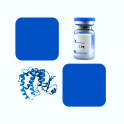
- Remove this product from my favorite's list.
- Add this product to my list of favorites.
Products
Newsletter
 |  |  |  |  |  |

Background
Interleukin 7 is also known as IL7, IL-7, and is a hematopoietic growth factor secreted by stromal cells in the red marrow and thymus. It is also produced by keratinocytes, dendritic cells, hepatocytes, neurons, and epithelial cells, but is not produced by lymphocytes. IL-7 stimulates the differentiation of multipotent (pluripotent) hematopoietic stem cells into lymphoid progenitor cells, It also stimulates proliferation of all cells in the lymphoid lineage (B cells, T cells and NK cells). It is important for proliferation during certain stages of B-cell maturation, T and NK cell survival, development and homeostasis. IL-7 is a cytokine important for B and T cell development. This cytokine and the hepatocyte growth factor (HGF) form a heterodimer that functions as a pre-pro-B cell growth-stimulating factor. IL-7 binds to the IL-7 receptor, a heterodimer consisting of Interleukin-7 receptor alpha and common gamma chain receptor. Il-7 promotes hematological malignacies (acute lymphoblastic leukemia, T cell lymphoma). Elevated levels of IL-7 have also been detected in the plasma of HIV-infected patients. IL-7 as an immunotherapy agent has been examined in many pre-clinical animal studies and more recently in human clinical trials for various malignancies and during HIV infection. IL-7 could also be beneficial in improving immune recovery after allogenic stem cell transplant.
Features
- Designed under ISO 9001:2015 and ISO 13485:2016
- Manufactured and QC tested under a GMP compliance factory
- FDA DMF filed
- Animal-Free materials
- Batch-to-batch consistency
- Stringent quality control tests
- No animal derived peptone and lactose used in production process
Source
GMP Human IL-7 Protein(GMP-L07H24) is expressed from human 293 cells (HEK293). It contains AA Asp 26 - His 177 (Accession # P13232-1). Predicted N-terminus: Asp 26
Molecular Characterization
This protein carries no "tag". The protein has a calculated MW of 17.4 kDa. The protein migrates as 23 kDa and 28 kDa (±3 kDa) under reducing (R) condition (SDS-PAGE) due to glycosylation.
Endotoxin
Less than 10 EU per mg by the LAL method.
Host Cell Protein
<0.5 ng/µg of protein tested by ELISA.
Host Cell DNA
<0.02 ng/μg of protein tested by DNA Fluorescent Staining method.
Sterility
The sterility testing was performed by membrane filtration method described in CP<1101>, USP<71> and Eur. Ph. 2.6.1.
Mycoplasma
Negative.
In vitro virus assay
Negative.
Purity
>95% as determined by SDS-PAGE.
Formulation
Lyophilized from 0.22 μm filtered solution in PBS, pH7.4 with protectants.
Reconstitution
Please see Certificate of Analysis for specific instructions.
For best performance, we strongly recommend you to follow the reconstitution protocol provided in the CoA.
Storage
Shipping at ambient temperature. Upon receipt, store it immediately at -20°C or lower for long term storage.
Please avoid repeated freeze-thaw cycles.
This product is stable after storage at:
-20°C to -70°C for 5 years in lyophilized state;
-70°C for 12 months under sterile conditions after reconstitution.
Bioactivity
Please refer to product data sheet.
(1) Rodrigues de Oliveira, Iansavitchous, Rysan et al (2024), "IKZF3/Aiolos H195Y mutation identified in a mouse model of B cell leukemia results in altered DNA binding and altered STAT5-dependent gene expression", Gene
(2) Chen, Hu, Chen et al (2024), "Expansion and Polarization of Human γδT17 Cells in vitro from Peripheral Blood Mononuclear Cells", Bio Protoc (2024) 14 (1), e4914
(3) Shipelin, Riger, Timonin et al (2023), "Effect of L-carnitine and resveratrol complex on the profile of cytokines and regulatory proteins in normal and obese rats", Vopr Pitan 92 (6), 83-97
Showing 1-3 of 3 papers.
Follow us